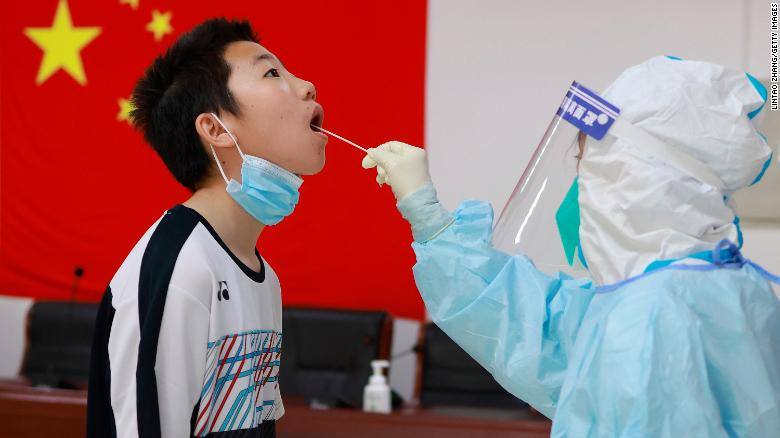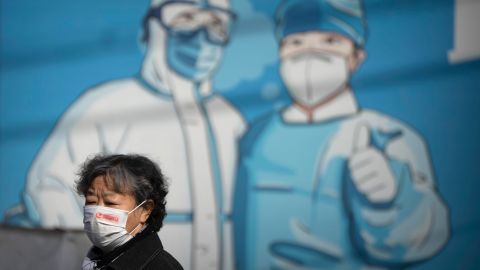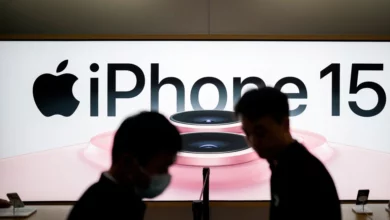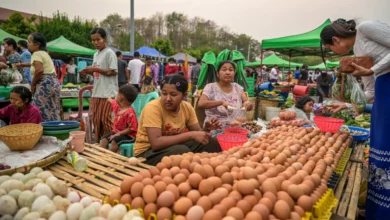
But the commitment to stick with it is already fueling scenes of chaos and misery across the country.
In the northwestern city of Xining, residents spent last week pleading desperately for food as they suffered through the latest of the country’s stringent lockdowns; to the west, in Lhasa, the regional capital of Tibet, angry crowds have been protesting in the streets after more than 70 days of stay-home orders.
In the central province of Henan, migrant workers have abandoned a locked-down Foxconn factory en masse, walking for miles to escape an outbreak at China’s largest iPhone assembling site. And, in the eastern financial hub of Shanghai, things are gloomy even at Disneyland – the park abruptly shut its gates on Monday to comply with Covid prevention measures, trapping visitors inside for compulsory testing.
In many other parts of the country, lockdowns, mandatory quarantines, incessant mass testing edicts and travel restrictions continue to cripple businesses and daily life, even as the rest of the world moves on from the pandemic.

Renewed zeal
Rather than relax Covid restrictions – as some had hoped for in the lead-up to the Communist Party’s five-yearly leadership reshuffle, Chinese authorities have ramped them up after Xi’s sweeping endorsement of the strategy.
“The 20th Party Congress didn’t provide a timetable for moving away from zero-Covid. Instead it highlighted the importance of sticking to the existing approach,” said Yanzhong Huang, a senior fellow for global health at the Council on Foreign Relations in New York.
The congress reinforced Xi as an unrivaled supreme leader, and saw him stack the Communist Party’s top ranks with staunch allies – including those who had loyally carried out his Covid policies.
“The new political ecology also provided more incentive for local governments to impose more draconian Covid control measures,” Huang said.
A renewed zeal for the policy can be seen most clearly in smaller cities. While metropolises like Beijing and Shanghai can draw on their experiences of major flareups to implement more targeted lockdown measures, smaller cities with no such know-how tend to pursue zero-Covid goals in a more aggressive and extensive manner, Huang said.
‘It’s simply not working’
The repeating cycle of lockdowns, quarantines and mass testing is taking a heavy toll on the economy and society. Public patience is wearing thin, and frustrations are building.
On Monday in Baoding city, Hebei province, a father wielding a knife drove through a Covid checkpoint in a desperate bid to buy milk powder for his son. Video footage of the scene and his subsequent arrest sparked uproar online; the following day local police tried to soothe tempers by saying the man had been fined only 100 yuan ($13.75) and that his child’s “milk powder problem” had been “properly resolved.”
On Tuesday, the death of a 3-year-old in Lanzhou, Gansu province, sparked another outcry, after the child’s family said lockdown measures had delayed emergency responders. Police said later the child had stopped breathing by the time officers arrived, but did not address the family’s accusations that an ambulance had been delayed. CNN has reached out to Lanzhou authorities for comment.
In another sign of how sensitive the issue has become, Chinese stocks rallied on Wednesday following unverified social media rumors that China was forming a committee to prepare an exit from the zero-Covid policy.
Those rumors were quashed, however, when the Foreign Ministry said it was “unaware” of any such plan.
Meanwhile, experts say they see no signs of the Chinese government taking steps that would suggest it is rethinking its approach.
Chinese health officials maintain that changing tack now would risk a huge surge in infections and deaths that could overwhelm the country’s fragile health care system.
Beijing has so far refused to approve for use the mRNA vaccines developed in Western countries, which have been shown to be more potent than those made and used in China. Experts say China also lacks an emergency response plan to cope with surging infections.
But Jin Dongyan, a virologist at the University of Hong Kong, said such catastrophic scenarios could be avoided with proper preparation.
Instead of spending vast amounts of time and resources on testing, contact tracing, quarantining and imposing lockdowns, authorities should introduce more effective vaccines and antiviral therapies and boost the vaccination rate among the elderly, Jin said.
With boosted immunity, asymptomatic or mild cases could be allowed to recover at home – freeing up space at hospitals to treat more severe cases, he said.
“Using lockdown and containment measures to deal with an infectious disease with such a low mortality rate and high transmissibility is no longer appropriate. The whole world has abandoned this approach – nobody can stand the cost, it’s simply not working,” he said.
Fear of the virus
Another hurdle to pivoting from zero-Covid is a pervasive fear of the virus among large swaths of the public, instilled by the Chinese government to justify its harsh control measures, experts say.
“Authorities have demonized Covid, exaggerating its severity and mortality rate and talking up long-Covid symptoms. Many ordinary people are still very afraid of the virus, with recovered Covid patients suffering from severe discrimination and stigmatization,” Jin said.
It was partly such fears that drove thousands of migrant workers to flee in panic from the Foxconn factory in Zhengzhou, he said.
Videos of people traveling on foot, dragging their luggage on roads and across fields, went viral on Chinese social media over the weekend. Zhengzhou, a city of 12 million, imposed sweeping lockdown measures last month after identifying dozens of Covid-19 cases.
The Foxconn facility has been racing to control an outbreak since mid-October, though the company has not disclosed the number of infections among its workers. On Wednesday, the Zhengzhou Airport Economy Zone, where the Foxconn plant is located, announced new lockdown measures.
As the Foxconn exodus thrust the Zhengzhou outbreak into the spotlight, the city’s health authorities have tried to allay public fears. On Monday, the Zhengzhou municipal health commission published a WeChat article with the headline: “Covid is not that horrible, but preventable and treatable.”
Huang, the expert at the Council on Foreign Relations, said misconceptions about the virus would complicate matters if China did at some point decide to move away from zero Covid.
“Even if in the future, China wants to change the narrative and play down the seriousness of the disease, some people might not buy into the new narrative,” he said.
As the winter approaches, experts warn that China could be hit by a new wave of infections – and a new cycle of draconian lockdowns.
China reported 2,755 local infections for Tuesday, the highest daily tally since August.
“Judging from the situation in China, there will be a major outbreak sooner or later. China has deployed tremendous efforts and paid a heavy cost to prevent that from happening, but in the end, it won’t be able to stop such a highly infectious disease from spreading,” Jin said.
CNN’s Beijing bureau and Yong Xiong contributed reporting.




